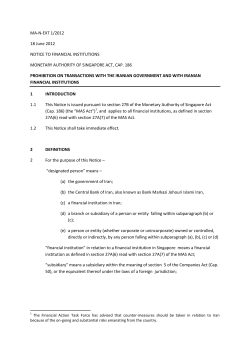
On Iran, Greece, Germany, majoritarianism Letters
Letters: On Iran, Greece, Germany, majoritarianism | The Economist 7/5/13 9:22 AM Letters On Iran, Greece, Germany, majoritarianism Jul 6th 2013 | From the print edition Letters are welcome via e-mail to letters@economist.com (mailto:letters@economist.com) Iran’s nuclear plans SIR – We noted the letter (June 29th (http://www.economist.com/news/letters/21580127iran-coastal-homes-mexico-city-prism-londonpublishing-bosses-newcastle) ) from Sir Richard Dalton in response to your leader on Iran. We were concerned by this passage: “You did not mention that Iran has a policy of converting its 20% enriched uranium into oxide, ready for research-reactor fuelmaking. This puts the material beyond use for bombs (short of a time-consuming, detectable and technically demanding process to turn it back into gas, which can be discounted in the medium term).” First, your briefing on Iran’s nuclear capabilities (“Breakout beckons (http://www.economist.com/news/briefing/21579815-neither-irans-election-nor-sanctions-normilitary-threats-are-likely-divert-it-path) ”, June 22nd) did mention the conversion of 20% enriched uranium into oxide. And second, the notion that this puts the material “beyond use for bombs” is simply wrong. The conversion of oxide back to uranium hexafluoride (UF6) gas is not “time-consuming”, is not necessarily “detectable”, and is not particularly “technically demanding”. What both your briefing and Sir Richard failed to point out is that Iran’s conversion of some of its 20% UF6 gas into a solid oxide form does little to allay fears that it is well on the path to getting nuclear weapons. Although some oxide has been made into fuel plates (not “rods”, as you put it) for a research reactor, the rest of the oxide stockpile can be converted back into UF6 feedstock for centrifuges within a couple of weeks. http://www.economist.com/news/letters/21580437-iran-greece-germany-majoritarianism/print Page 1 of 6 Letters: On Iran, Greece, Germany, majoritarianism | The Economist 7/5/13 9:22 AM A few other points about your briefing. You used a term, “medium-enriched uranium”, that has no scientific meaning and creates a false impression that Iran is at some sort of midpoint in the enrichment process. You talk of “20% or medium-enriched uranium”. Yet the International Atomic Energy Agency defines uranium containing 20% or more of the fissile isotope U-235 as highly enriched. Not only is Iran close to a breakout capability on weapons but the huge growth in its installed centrifuge capacity means that we will need to be as worried by its large stock of 5% enriched UF6 gas as we are by its current 20% holdings. You concluded that: “What nobody knows, quite possibly not even the supreme leader himself, is when and how Iran will step across the nuclear threshold.” Arguably, save testing a device and mastering a delivery system, it has already done so. Simon Henderson Washington Institute for Near East Policy Washington, DC Olli Heinonen Belfer Centre for Science and International Affairs Cambridge, Massachusetts SIR – Why not push for a nuclear-weapons-free zone in the Middle East? Iran’s supreme leader has endorsed the idea, as has the Non-Aligned Movement, representing 120 countries. A conference in Finland that was meant to discuss the plan was scuttled by America and Israel. Indeed, the regional situation is complicated by what Avner Cohen, an Israeli historian, calls the world’s “worst kept secret”: Israel’s nuclear arsenal. As long as some countries are allowed nuclear weapons and others are not, the West will continue to tussle, perhaps violently, with Iran. Brett McCully Oakton, Virginia * SIR – As you correctly concluded, Western policy on Iran “makes a nonsense” and “round after round of negotiations” have been utterly ineffective. However, your hawkish suggestions will also be http://www.economist.com/news/letters/21580437-iran-greece-germany-majoritarianism/print Page 2 of 6 Letters: On Iran, Greece, Germany, majoritarianism | The Economist 7/5/13 9:22 AM equally inconsequential and can badly backfire. Iran’s quagmire can only be resolved through bilateral, face-to-face, consequential diplomacy and direct negotiation between the governments of United States and Iran. The two countries’ common goal should be a grand bargain: a tangible, verifiable and sustainable security guarantee to Iran by the United States and its Western allies in return for the compartmentalisation or curtailment of Iran’s nuclear programs; its full and unconditional support of the American-backed government in Iraq; and its co-operation elsewhere in the Middle East. Najmedin Meshkati Former senior science and engineering adviser to the Office of Science and Technology at the State Department Los Angeles The far-right in Greece SIR – I fully agree that “Greece needs a more robust anti-racism law” (“Racist dilemmas (http://www.economist.com/news/europe/21579881-greece-needs-more-robust-anti-racism-lawracist-dilemmas) ”, June 22nd). But I do not agree that banning the neo-Nazi Golden Dawn political party “could be counterproductive” and may be contrary to the right of freedom of association. I recently reported on Golden Dawn following an official visit to Greece. The leadership of this party has historical links with the military junta that ruled Greece in the 1970s and is openly contemptuous of democracy. Greek democracy is under serious threat. I have urged the Greek authorities actively to prosecute individual members of Golden Dawn and others who have engaged in hate speech or violent racist attacks. Under international human-rights law the Greek authorities would be within their rights to ban Golden Dawn as well. The right to freedom of association is not absolute and may be restricted http://www.economist.com/news/letters/21580437-iran-greece-germany-majoritarianism/print Page 3 of 6 Letters: On Iran, Greece, Germany, majoritarianism | The Economist 7/5/13 9:22 AM to protect the rights of others. Greece is bound by the International Convention on the Elimination of All Forms of Racial Discrimination, article four of which calls on states to ban racist organisations. Moreover, Greece is bound by the case law of the European Court of Human Rights, which has found that, under certain conditions, states can impose restrictions on political parties and their members or supporters. Such restrictions are possible if a political party has been found to use violence to achieve its goals and deny fundamental rights and freedoms, including the principle of non-discrimination. Nils Muiznieks Commissioner for human rights, Council of Europe Strasbourg Merkel’s muddle SIR – I thought your special report on Germany (http://www.economist.com/news/specialreport/21579140-germany-now-dominant-country-europe-needs-rethink-way-it-sees-itself-and) (June 15th) was an accurate reflection of the situation here. However, I differ with your description of Angela Merkel as “Europe’s most impressive politician” (“The reluctant hegemon (http://www.economist.com/news/leaders/21579456-if-europes-economies-are-recover-germanymust-start-lead-reluctant-hegemon) ”, June 15th). Judging from her countless U-turns, especially on tax reform, nuclear energy and the minimum wage (all calculated to curry favour with voters), her main concern has been to cling to power. Since becoming chancellor she has in fact been drifting leftward and has been getting rid of potential rivals in her party (directly and indirectly), especially those with liberal economic views. It http://www.economist.com/news/letters/21580437-iran-greece-germany-majoritarianism/print Page 4 of 6 Letters: On Iran, Greece, Germany, majoritarianism | The Economist 7/5/13 9:22 AM would now be little problem for her to form a coalition with the Social Democrats. One could say that such behaviour is politically shrewd, or even impressive, though I prefer leaders who have clear principles rather than those who trim their sails according to the wind. As you rightly point out, her Energiewende is a mess and her European policy hardly deserves the name. And it is a shame that Mrs Merkel’s apparent enthusiasm for competitiveness in other countries does not stretch to include services in Germany. But then there is no strong tradition of liberal economic thinking here. Roger Graves Hamburg, Germany Majority quip SIR – Well done for highlighting the perils of creeping democratic majoritarianism by autocratic rulers (“Zombie democracy (http://www.economist.com/news/leaders/21579850-note-turkeysprime-minister-among-others-winning-elections-not-enough-zombie-democracy) ”, June 22nd). Although the thrust of your leader was aimed at Turkey, it provided a succinct and highly compelling argument in favour of true citizen participation in the democratic process. I look forward with eager anticipation to The Economist’s campaign for Britain’s withdrawal from the undemocratic European Union and the restoration of true democracy in Britain. Tim Parsons London SIR – Henrik Ibsen best portrayed the clash between majoritarianism and democracy in “An Enemy of The People”: “Oh, yes, you can shout me down, I know! But you cannot answer me. The majority has might on its side, unfortunately; but right it has not.” A majority of Turks may approve of Recep Tayyip Erdogan but this does not justify his actions against the protesters. Some of those protesters, however, would do well to heed Ibsen’s other wise words: “You should never wear your best trousers when you go out to fight for freedom and truth.” Jonathan Ha http://www.economist.com/news/letters/21580437-iran-greece-germany-majoritarianism/print Page 5 of 6 Letters: On Iran, Greece, Germany, majoritarianism | The Economist 7/5/13 9:22 AM New York * Letter appears online only From the print edition: Letters http://www.economist.com/news/letters/21580437-iran-greece-germany-majoritarianism/print Page 6 of 6
© Copyright 2025





















